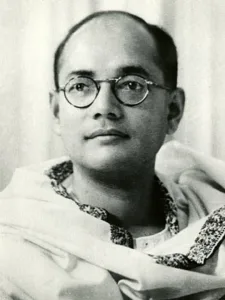Summary
Subhas Chandra Bose, born around January 23, 1897, in Cuttack, India, played a significant role in India’s struggle for independence against British rule. A prominent revolutionary, Bose led an Indian national force against Western powers during World War II. His approach to independence was characterized by militancy and a commitment to socialist policies. Bose, a contemporary of Mahatma Gandhi, was both an ally and adversary to the iconic leader at different times. He passed away on August 18, 1945, in Taipei, Taiwan.

Early Life
Subhas Chandra Bose, born to a prominent Bengali lawyer, faced expulsion from Presidency College, Calcutta, in 1916 due to nationalist activities. After graduating from the Scottish Churches College, he ventured to the University of Cambridge for Indian Civil Service preparation. Despite passing the exam in 1920, Bose resigned in 1921, driven by nationalist fervour. Throughout his career, he received support from his elder brother, Sarat Chandra Bose, a wealthy Congress Party politician.
Subhash Chandra Bose actively participated in the noncooperation movement led by Mahatma Gandhi, joining the Indian National Congress. Gandhi advised him to collaborate with Chitta Ranjan Das in Bengal, where Bose became involved in various roles such as a youth educator, journalist, and commandant of the Bengal Congress volunteers. His activism resulted in his imprisonment in December 1921. Following his release in 1927, he faced deportation to Burma due to suspicions of involvement in secret revolutionary movements. Upon his return, Bose became the president of the Bengal Congress, working alongside Jawaharlal Nehru to represent the more militant faction against the compromising Gandhian faction within the Indian National Congress.
The Defiant Journey of Subhas Chandra Bose
Amid increasing vocal support for Gandhi within the Indian National Congress, Bose found himself in detention due to his association with an underground revolutionary group, the Bengal Volunteers, during the initiation of the civil disobedience movement in 1930. Despite his imprisonment, Bose was elected as the mayor of Calcutta. Facing multiple arrests for suspected involvement in violent activities, he was eventually allowed to travel to Europe after contracting tuberculosis. In exile, he wrote “The Indian Struggle, 1920–1934” and advocated for India’s cause with European leaders. Returning to India in 1936, he was arrested but released after a year.
Subhas Chandra Bose, once a prominent leader within the Indian National Congress, found himself at odds with Mahatma Gandhi’s conservative economic views and non-confrontational approach to independence. Elected as Congress president in 1938, Bose advocated for broad industrialization, which conflicted with Gandhi’s preference for cottage industries and self-reliance on local resources. Despite winning re-election in 1939, Bose resigned due to a lack of Gandhi’s support, later forming the Forward Bloc to gather radical support. Even though he was imprisoned in 1940, Bose’s determination to fast to death compelled the British government to release him. In 1941, he made a daring escape from Calcutta and eventually reached Germany via Kabul and Moscow.
Also Read: Life of Chevalier D’Éon: Espionage, Diplomacy, and Gender Controversy – Know More (kmore.info)
 Subhas Chandra Bose: From Berlin Broadcasts to the Indian National Army’s Struggle
Subhas Chandra Bose: From Berlin Broadcasts to the Indian National Army’s Struggle
Subsequently, Bose found himself under the influence of the newly established Special Bureau for India in Nazi Germany during World War II, guided by Adam von Trott zu Solz. Collaborating with other Indians in Berlin, Bose regularly broadcasts on the German-sponsored Azad Hind Radio in various languages. Following the Japanese invasion of Southeast Asia, Bose left Germany and arrived in Tokyo in May 1943.
Taking charge of the Indian Independence Movement in East Asia on July 4, he formed a trained army of around 40,000 troops with Japanese assistance. Bose proclaimed the establishment of a provisional independent Indian government on October 21, 1943, and his Indian National Army, alongside Japanese forces, advanced into India, reaching Indian soil on March 18, 1944. Despite facing defeat and retreat in battles, the Indian National Army maintained its identity for some time before Bose’s fortunes ended with the defeat of Japan.
After Japan’s surrender announcement in August 1945, Bose, seeking refuge in Southeast Asia, allegedly succumbed to burn injuries sustained in a plane crash at a Japanese hospital in Taiwan.
Sources:
